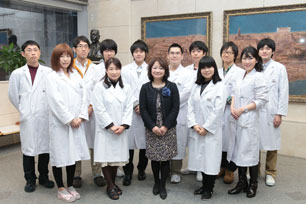Hideko Kanazawa, Professor, Faculty of Pharmacy
Aiming to contribute to medicine through "fun"damental research!
You may feel a little uncomfortable hearing the word physical chemistry, but its research is actually quite interesting. Seven graduate students, nine sixth-year students, eight fifth-year students and tow fourth-year students are enrolled for research in my lab.

In the division of Physical Pharmaceutical Chemistry, we synthesize functional polymers that change character according to change in external environment, and apply them to drug delivery system (DDS), probes for cellular imaging, and separation systems. The main objective of our research is to design functional polymers for application in medical treatment by using a new system that we have developed. Though it is a continuing process of trial and error, we engage in research in an effort to develop a DDS that will reduce the burden on patients by reducing the amount and number of doses of anti-cancer agents that have strong side effects. Some of what we have developed so far, such as the separation system, have been put into practical use. Hence, though it is basic research, our aim is to contribute to medical treatment, and we are able to conduct research guided by the principles of practical learning in wide-ranging fields, from drug development to clinical application. We also conduct joint research with companies and other institutions, and we have presented our research results both at home and abroad. Career paths for graduates of our division are varied; they join pharmaceutical companies, and become researchers at chemical companies or pharmacists at hospitals.
In basic research, out of the 100 efforts we make, only 1 pays off. Especially in my laboratory, we cover everything from designing and synthesizing new material to applied research, so although we can conduct highly original research, we have to start many of them from scratch. Therefore, we may not succeed before a student graduates. On the other hand, we can enjoy a great sense of achievement when we do succeed.
Anyone can conduct experiments, but that cannot be called research. I consider a laboratory to be a place to learn “what research means”. Researchers always have a new goal and feel excited to face challenges. Research may mean setback after setback, and there may be times when we feel discouraged, but we cannot continue research if we get depressed. It is important to shift our emotional gears immediately and keep trying experiments with a positive mindset. Such experiences should help in the real world when facing new challenges at work, even if not as a researcher. Although there may be many difficulties, if it is for something that contributes to society, I would like my students to work hard with confidence and strong sense of purpose.
Student's Voice
Kotoko Kimura, Sixth-year Student,
Faculty of Pharmacy, Department of Pharmacy
Aiming to develop an innovative DDS
"You guys exercise a lot during lunch break." "Your laboratory Christmas party is so extravagant!" These are things my friends often mention to me about Professor Kanazawa's lab, but we also work hard on our research.
In our lab, we conduct research on themes such as "development of DDS for the purpose of application to hyperthermia for cancer treatment" and "development of temperature-responsive chromatography".
Professor Kanazawa genuinely cares for us students. During our weekly research report, she offers advice on the research itself, but also advice for each student according to his/her career goals, whether they aim to join a pharmaceutical company or want to become a pharmacist. Under the warm guidance of Professor Kanazawa, we will continue to aim at developing an innovative DDS.
*Position titles, etc., are those at the time of publishing.
